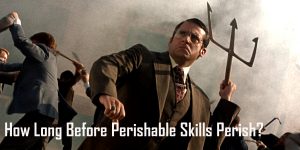We humans always knew we need to keep training to keep sharp, but still we “chip away” at the edges through time. All your performance bases in every topics are covered in this demise. Cave men practiced their spear throwing, and their wounded prey chasing until they could no longer hit the target or run well. The concept of “perishable skills” evolved into our vocabulary.
Life has gotten way more complicated than tossing pointy sticks and just about every job, chore, hobby and skill has multiple layers of mental and physical performance that are stabilized, honed then slowly disintegrate.
The first time I officially heard about “perishable skills” was in police training a very long time ago. The 1970s. But we also heard the phrase “use it or lose it” and versions of similar advice for decades.
Diminishing abilities abound, no matter the topic, tennis, typing, rodeo, baseball, racing…life. In many businesses like policing and the military, there’s never enough time, money or manpower to enforce rigorous training cycles and fight back the “expiration dates.”
How long before perishable perishes? In hot pursuit of training ideology, various US state police and military, even in the business-world, training criteria has segmented the disintegration times into three categories:
- 1) Perishable skills (half-life of less than two and a half years),
- 2) Semi-durable skills (half-life of two and a half to seven and a half years), and…
- 3) Durable skills (half-life of more than seven and a half years).
How were these timetables developed? By whom? For whom? Organizations have to start somewhere and justify their timetables. We were once inundated with the “10,000 hour to expertise” training-experience rule and this idea further advertised by Gladwell’s bestselling Outliers book, but then we quickly learned from about a ton of experts that everyone’s aptitudes are different and “hours-to-expertise” differ greatly from person-to-person. (And please quit quoting the 10,000 hours rule, people!) I too would like to suggest that such time limits are arbitrary and discretionary because all people are different. This established, we might therefore, logically think that “hours-to-perish,” despite attempts to quantify is also different too for different people, different on both the up and down scales.
Lifetime dedicated commitment lingers longer. There has been considerable study in these performance matters and the topic of tennis is often used in sports performance analysis. So, I will use a quick tennis analogy. Imagine a lifelong super tennis champion, like Serena Williams or Roger Federer. They age, they just lose a step, even though they are constantly working out and playing. Eventually they must retire as fresh kids rise up. They retire to a tennis club and become resident tennis pros. There they teach tennis and so forth. It is hard for me to imagine that a 60, even 70 year old Serena or Federer would not still beat almost ALL “normal” tennis people in the neighborhood, country club. I think this because they have indeed accumulated so much time in the enterprise that even Serena and Federer, at their near-worst, are still above-average, darn good tennis players. Aspects have perished, but since they were once so high up, that even with significant perishing, they might still pretty darn good for a long time.
I could go off on an in-depth tangent, deep-dive on this topic and I have in various books, essays and articles, but in summary, it’s simple, I (and we-many) think that perishable skill timetables are highly situational in topic and person.
Ol’ René Descartes started that little ditty, Cogito, ergo sum, Latin for – “I think, therefore I am.” And we are human and therefore will stop thinking someday. Perish the thought! We’ll slow down and stop…playing. In other words – “I perish, therefore perishability is inevitable.”
But while we are still alive, kicking and un-perished, we can use that caveman idea that we humans need to keep tossing spears, keep training to keep sharp and this simple caveman idea instantly covers all your bases. You still might end up a pretty good ol’ pro at the old Caveman, Spear Pro Shop and Country Club.
More on this subject https://www.chieflearningofficer.com/2020/10/29/skills-arent-soft-or-hard-theyre-durable-or-perishable/
Hock’s email is Hock@hockscqc.com
*********
More like this in Fighting Words. Click here-


